Aeschylus
400s BC
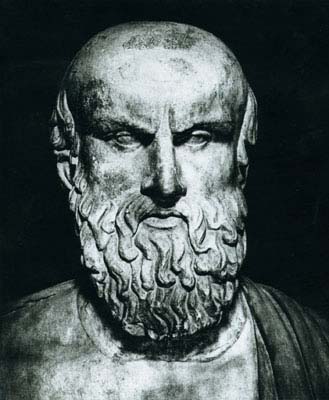
Seven Against Thebes is a tragedy about a fratricide and an attack on the City of Thebes, and a discourse between women and men, and faith in the Olympian gods of the Greeks.
Prometheus Bound is the famous tragedy of the titan who is punished for giving the gift of fire to mankind, and who now has choice words to say to every man and god that visits him.
The Persians is a play about real events: the destruction of the Persian fleet by the Athenians at the Battle of Salamis, while Emperor Xerxes watches on from atop a craggy outcropping.
Greece
Greek
Sophocles
400s BC
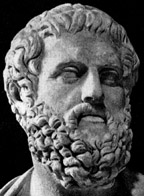
Antigone is a play about the nature of Justice. Is doing what is unlawful ok when it satisfies the higher law of true Justice? Antigone wantes to bury her brother against the law and wishes of the King of Thebes, and a drama takes place, ending with an awakening about what is most important in life.
Oedipus Rex is about male pride (hubris) and the relationship between man and the god(s). Sometimes pride is so powerful that it blinds you to people trying to help you. Oedipus kills his own father and marries his mother, and sires his half brothers...but does not know. This is a tragedy!
Greece
Greek
Euripides
400s BC
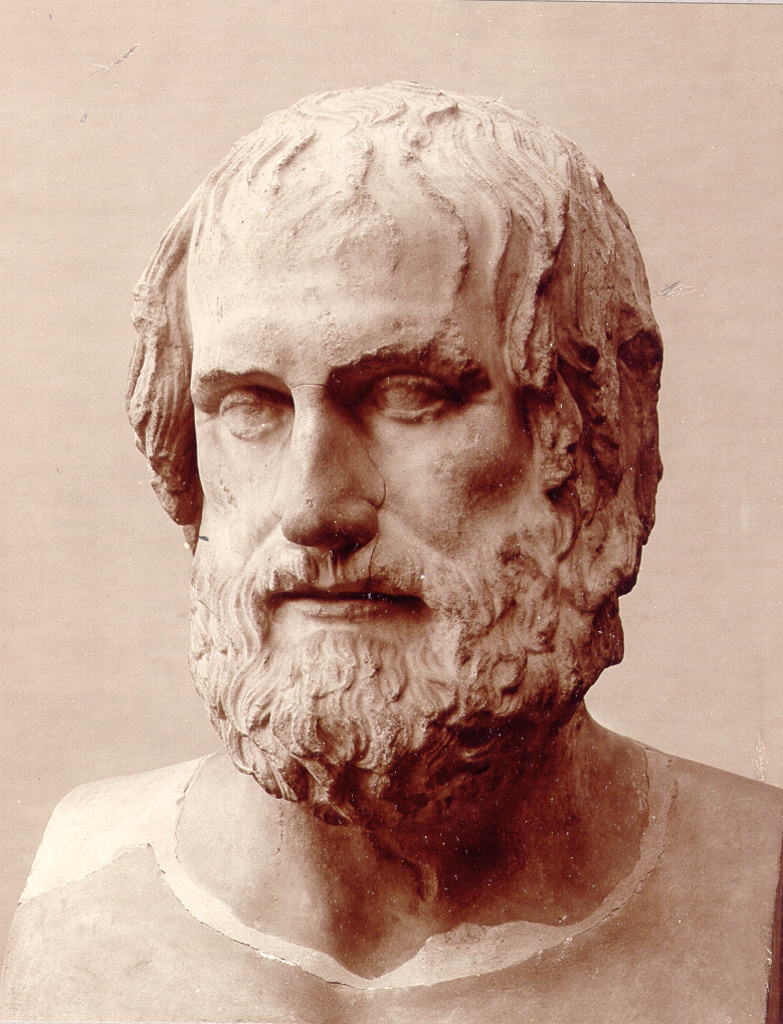
The Bacchae tells the story of the god Dionysus and the hubris (foolish pride) of the new king of Thebes, Pentheus, who does not recognize him as one of the powerful gods and all heck breaks loose when the women go to 'worship' Dionysis in secret outside of town, and Pentheus finds them a kind of ecstasy. Moral: don't ignore the irrational.
The Phoenician Women is about the sons of Oedipus (see Sophocles) battling it out for control of Thebes.
Iphigenia at Aulis compares barbarian and Greek civilization as the background of a daring escape in the lands north of the Euxine (Black) Sea.
Greece
Greek
Aristophanes
300s BC
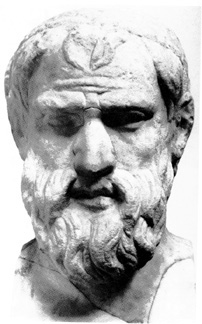
Lysistrata is a comedy about war and men and women- all the women in a Greek city-state agree to 'declare war' on the men by withholding sex from them until they stop fighting a pointless war with another city- comedic episodes ensue.
The Birds is a classic epic comedy about human (and Greek-godly) faults, as an Athenian tries to get birds to take over Greece and replace the gods as the new rulers...
The Clouds is a comedy about Socrates, sophistry and a spoiled youth in Athens. A father sends his brat kid who likes fast horses, wine and girls, to Socrates for tutoring. Eventually he is taught and then argues his father into leaving the house. The dad burns down the school.
The Frogs is another comedy- the god Dionysus complains that 'there are no more good poets' now that Euripides has died, so he goes to resurrect Euripides from Hades. He goes to Charon and must now choose between Euripides and Aeschylus, for Charon thinks HE should be resurrected instead, because he is the better writer!
Greece
Greek
Apollonius of Rhodes
200s BC
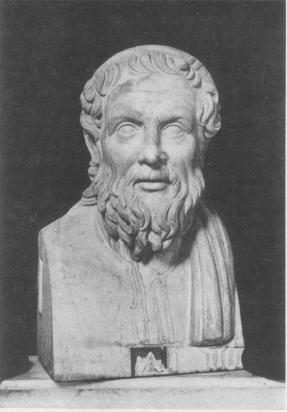
Argonitica
This book is better known as 'Jason and the Argonauts.' Written at the famous Ptolemaic capital of Alexandria, Egypt, it is an adventure story about Jason, a Greek, who seeks the legendary Golden Fleece in order to get rich. He travels all around and finally to the north coast of the Black Sea, where he meet a lovely princess, Medea, who falls in love with him. He is not the typical hero- scared of fighting and yet adventerous and witty. He has an idealistic, dreamlike way of thinking and acting, he meets the god Apollo, fights and runs from strange and amazing beasts, and solves puzzles. On the way, he discovers, in a way, what heroism really is.
Egypt
Greek
Herodotus
400s BC
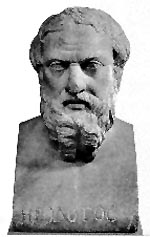
The Persian Wars
Born at Halicarnassus in Ionia when it was under the rule of the Persian Empire, Herodotus was very concerned with the Greek victory over that Empire. He followed it closely and wrote about it. Later he wrote about his extensive travels to Egypt and other places. Because of his style, he is known as 'The Father of History,' since The Persian Wars is history's first real history textbook. It covers the great battles of Marathon, Thermopolyae Pass and Salamis, the strategy and the preparations.
Greece
Greek
Thucydides
400s BC
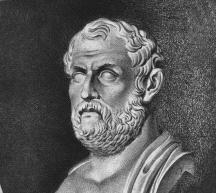
The Peloponnesian Wars
One of the greatest war books ever written, Thucydides wrote this book 'to last forever,' and it is well on its way. It details the Greek civil conflict between Athens and Sparta- the conflict that would spell the end of the Golden Age. Athens would lose miserably and nothing would be the same. Thucydides used facts only- no myth nor heresay, which on occasion Herodotus was guilty of. Not only about physical war, the book rails against the corrupting effects of the war on Athenian citizens' minds, as a formerly just polis which attacked a small island simply because they remained neutral in the war. No gods are referenced, either(!).
Greece
Greek
Plato
400s BC
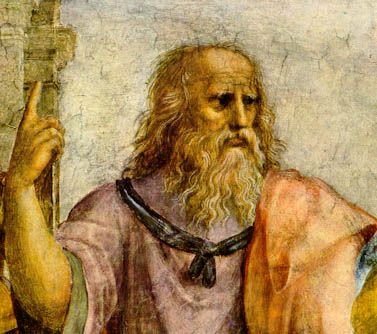
The Apology is the true story of the trial, in 399 BC, of the philosopher Socrates in Athens. In this book Plato writes as an observer at the trial- relaying what Socrates said and why. and the genius of Socrates radiates forth from every page.
The Crito contains Socrates' answer to his friend on the question of, 'why would you sumbit to their death-sentence when you were not guilty?' Socrates answers in a surprising way.
The Phaedo is the remarkable day of discussion and deliberation and farewell that Socrates and his friends have on day of his death. He shows here that the soul exists before birth and that death comes from life... but can life come from death?
The Republic is the masterpiece of classical political philosophy. Here is the ideal state- and the ideal citizen. Justice as a virtue is covered, as well as Plato's famed metaphor of 'The Cave.' In the individual lies the foundation of the state, and Plato gives an astounding teaching on how the virtue of the individual should be translated to the level of the ideal state. Here also is the Theory of Forms.
The Laws concerns law and order in a just society. A frank and brilliant discussion of laws ranging from everyday stuff like marriage, crime, trade and commerce- to deeper matters like the nature of the soul and just values and how best to achieve them. The root of the matter is found in the best law system: aristocratic elders in each city who guard that city's laws- ensuring fairness and prosperity, law and order in the city.
The Symposium is Plato's treatise on the philosophy of love. Two men in Athens have a dialogue about what love is- finding that love is a universal and a regular thing. How people come to love others is revealed and in this intelligent work, perhaps even who to love is shown.
Greece
Greek
Aristotle
300s BC
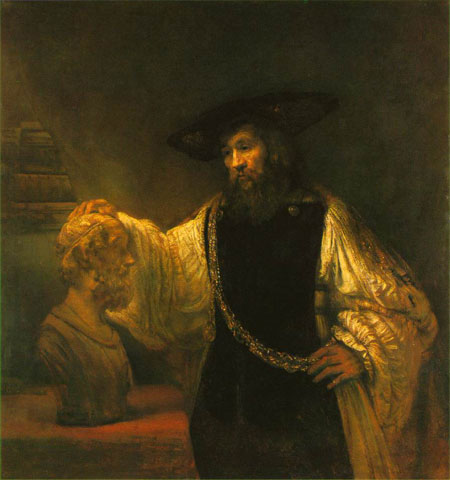
Metaphysics presents Aristotle's adaptation and ultimate rejection of Plato's Forms theory, and then tackles very tough questions: What is reality? Are there any universal things that must exist? This is the foundational work for all else done in matters of Western speculation on the nature of reality.
The Politics shows how high a degree of political culture the Greeks had by the 300's BC. Greek constitutional structures (esp. of Athens and Sparta) are analyzed, the importance of real education to good citizenship, and human nature (man is a political animal)- ie, family, village, polis are the natural outgrowths of individual human nature. Only in the polis will human perfection be found. Importantly, he reminds us that each situation should be considered in context, not with blanket decrees- and of coursem lack of following his advice has led us to our modern bureaucratic jumble.
The Nichomachean Ethics is the foundational work for our views on Ethcis. It shows us two major definitions that have shaped the way the West views life: What the 'good' is and the three 'lives.' The good is that which ones action seeks to accomplish, and the three lives are the 'common life,' the 'political life,' and the 'contemplative life.' He shows us that virtue in itself is worth being a Good person, that true happiness comes with the 'Golden Mean.' Observation of our actions and introspection is necessary for a Good life, and not submitting to basic animalistic instincts, helps too.
Greece
Greek
Euclid
300s BC
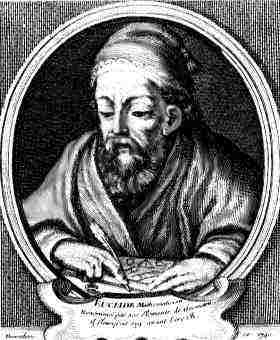
The Elements
Perhaps the most famous and longest running textbook of all time, The Elements is the landmark work in which geometry, as explained by the master mathematician of the classical world. For 2,000 years, this book was the way that people learned geometry, because it is here, laid bare, in elegant prose unlike most math books. As a textbook, The Elements was first used in Egypt by Ptolemy, whom Euclid told, "there is no royal road to geometry." Yes, he was telling us that it is hard!
Egypt
Greek
Archimedes
200s BC
The Works

Another master mathematician (and inventor) of the Classical World, this is the guy who ran naked from his bath into the street shouting, 'Eureka!' When he discovered how to measure the volume of gold (to see if the seller cheated on it)- upon the request of the King of Syracuse... he could do it by using water to displace the volume. He also figured out the idea of building simple machines, and used them to make amazing things. A huge lever that could pick up boats out at sea, 'Greek Fire,' and more.
Sicily
Greek
Ptolemy
2nd Century
The Almagest
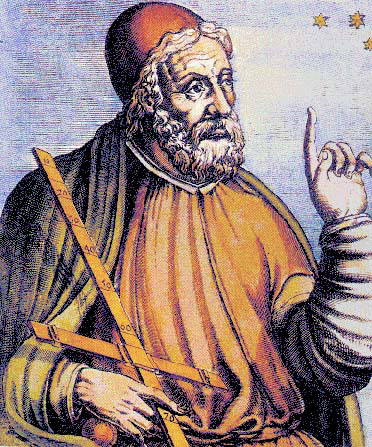
The Almagest is a science book- it carries the teachings of the old world's best astronomer and geographer, Ptolemy. Like Euclid's 'Elements,' it is a long running textbook, this one on astronomy. It discusses the solar system's 'geo-centric structure' in terms of the Earth at the center, the Moon, Sun and Planets orbiting it- with the 'celestial sphere' of fixed stars behind. To explain the motions of the planets, the 'epicycle' is introduced- reflecting mathematical clarity and outstanding deduction, though completely, absolutely, 100%, false!
Egypt
Greek